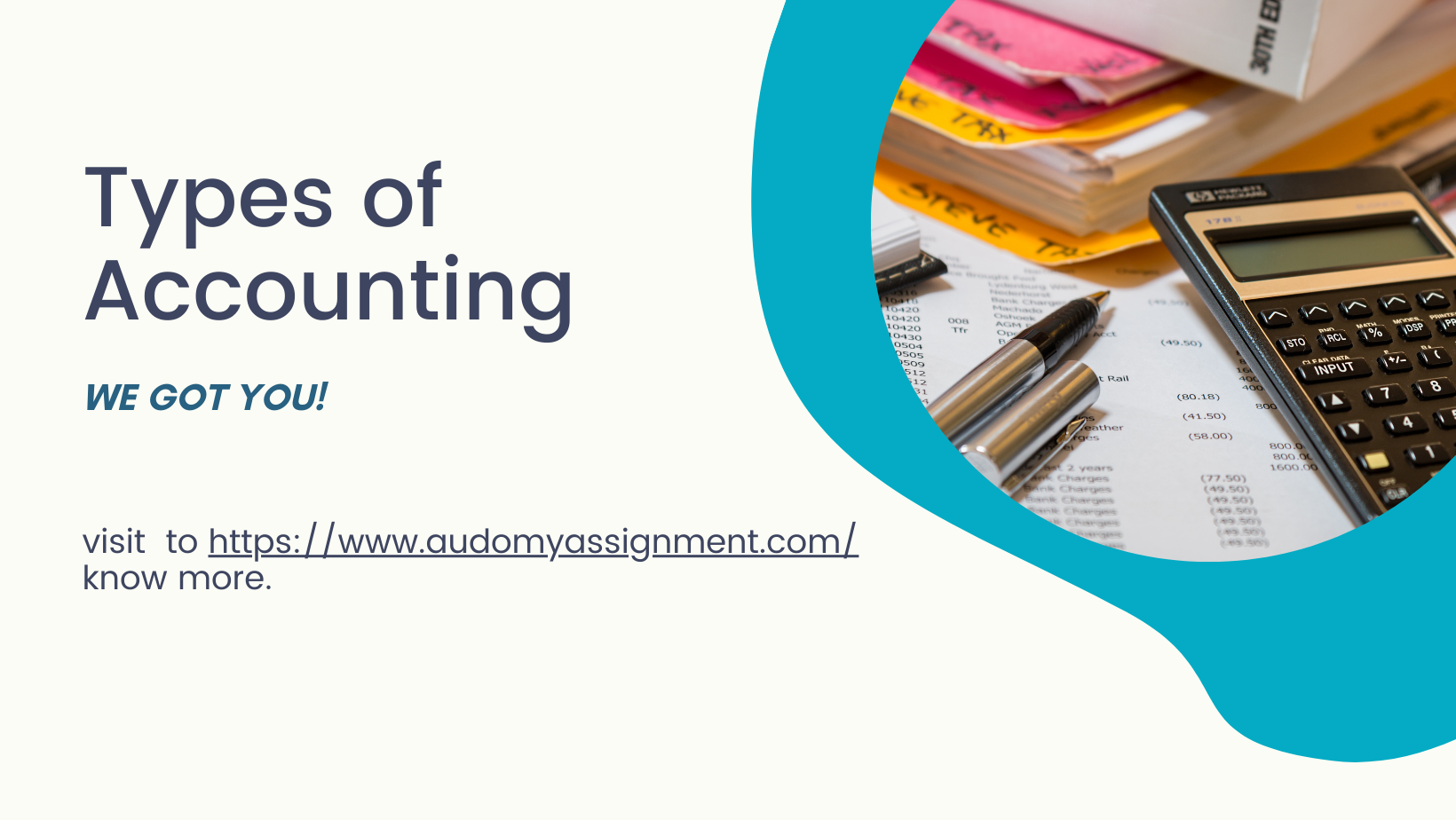Types of Accounting
Accounting is the department responsible for maintaining records of a business’ financial dealings. The accountants compile a summary of the company in the form of diary entries. The books need to be balanced, thus these entries are necessary. For audits and other oversight by authorities, accountants compile detailed financial records. You can also have accounting Assignment help to have a clear understanding about it. It’s possible that the accountants will use IFRS (International Financial Reporting Standards) rather than GAAP (Generally Accepted Accounting Principles).
By reviewing the company’s books, an analyst can obtain a good feel for its financial health. This means that for publicly traded companies, the books of account must be examined to arrive at an accurate valuation.
What is the process of accounting?
One of its most crucial activities for any company is accounting. It could be handled by a single bookkeeper or auditor in a small company, or by an entire team in a major company’s financial department. Cost accounting, financial accounting, & managerial accounting all provide several reports.
The financial statements summarize the activities, financial condition, & cash flows of a sizable organization over a specified time period. These are concise reports based on hundreds of different financial dealings. Therefore, all accounting certifications necessitate a specific amount of time of real-world accounting experience. It adds in addition to the years spent in school and the rigorous testing that comes with it.
A bookkeeper in the UK can take care of basic bookkeeping duties. Complex jobs, on the other hand, may necessitate a different set of skills or certifications, such as those offered by the Certified Management Accountant or the Certified Public Accountant. The Canadian Certified Accountant (CPA) handles difficult responsibilities.
The accounting profession requires candidates to earn the CA, or Chartered Account.
To be a chartered accountant, one must pass a rigorous examination. The CA is the go-to expert for any and all questions pertaining to taxes and financial reporting.
There are many different kinds of accounting jobs in the financial sector, and they all do somewhat different things. Many elements, including the nature of the business, the breadth of the day-to-day tasks, the opportunities for professional growth, and the salary range of the accountant all contribute to the diversity among accounting specializations.
In this article, we’ll take a look at four main categories to classify the many subfields of accounting as well as the occupations associated with them.
The five types of accounting occupations described below are representative of the breadth of opportunities available within the field, but they may be categorized differently by other professional accounting sources. Corporate, public, government, & external audit are the four main subfields of the accounting profession. Most accounting jobs only require a bachelor’s degree, but employers increasingly favor candidates with master’s degrees, especially in accounting. In the sections that follow, we’ll delve into the particulars of each of the most frequently encountered branches of accounting.
Corporate Accounting
Overview:
Get a brief overview of corporate accounting, which includes the collection, analysis, and presentation of financial data with the goal of external reporting & tax compliance. Keeping accurate records & ensuring that financial and tax filings are in accordance with proper rules. There are regulations, & standards are two of the primary responsibilities of a corporate accountant. Generally Accepted Accounting Principles (GAAP), International Financial Reporting Rules (IFRS), as well as the Internal Revenue Code are just a few examples of the many different kinds of accounting principles, standards, & procedures that exist (IRC). Get the Do My Assignment Online to know more about it.
Employment Opportunities:
Corporate accountants often report to the outside world in their day employment. This may involve dealing with a company’s financial statements or assisting with tax paperwork. Financial accounting also encompasses executive professions like financial managers, analysts, & CFOs. It’s not uncommon for managerial duties to be included in a job description for a financial accountant.
Managerial Accounting
Overview:
Managerial Accounting is the type of accounting that can help you ‘Do My Assignment‘ effectively. It is primarily concerned with providing internal stakeholders, such as managers and decision-makers, with the financial information they need to make informed decisions and manage a company’s operations efficiently. Managerial accounting focuses on cost analysis, budgeting, performance evaluation, and other tools that can aid in making strategic decisions related to resource allocation, product pricing, and overall business management.”
Employment Opportunities:
Managerial Accounting offers a wide range of employment opportunities, making it a promising field for those interested in finance and business. Graduates with expertise in managerial accounting can explore careers as financial analysts, cost accountants, management consultants, budget analysts, and even as financial managers. These roles can be found across various industries, including manufacturing, healthcare, retail, and finance, allowing professionals to choose a path that aligns with their interests and career goals. With the increasing demand for data-driven decision-making in today’s competitive business landscape, the prospects for employment in managerial accounting remain robust and ever-evolving.”
Public Accounting
Overview:
Professional public accountants serve clients from the outside economy, be they businesses, people, or government agencies. Helping clients maintain honest financial records, files, & reports is part of their job. A public accountant’s employment frequently involves interacting with tax rules & financial reporting, therefore they must keep their understanding of GAAP as well as the current tax code. They need to be familiar with and able to implement general accounting principles and systems. Those who work in public accounting with the assignment help UK need to be analytical thinkers who can focus on the finer details. Being able to interact with customers successfully requires excellent people skills.
Employment Opportunities:
Jobs in public accounting can be found at companies providing services to the general public. The company’s clientele may range from sole proprietors and small enterprises in the immediate area to multinational corporations with operations in multiple countries. Based on the firm’s structure, public accountants have opportunities to rise through the ranks and become team leaders or even corporate executives. Career advancement in public accounting frequently includes opportunities for management and executive roles inside organizations.
Government Accounting
Overview:
Whether it be at the national, state, or regional level, government accountants are always working for the people. Most of the time, their frameworks are distinct from those used by public accountants. Accountants working for the government are subject to stricter vetting procedures since they may be entrusted with sensitive data in certain roles.
Employment Opportunities:
Experts in government finance are responsible for a wide variety of tasks. They may perform reviews of private documents or tax returns, keep tabs on the budgets of government agencies, or oversee the management of public funds. A website aimed at financial experts, cautions its readers that salaries in the public sector may be lower than in the private industry for similar jobs. However, the benefits and perks that come with working for the government can make up for the lower pay. Monster.com found that compared to civilian occupations, those in the public sector typically provide greater education, insurance, healthcare, & retirement benefits.
Forensic accounting
Overview:
Forensic accounting is a subfield of auditing that focuses on gathering and restoring financial records that have been lost or destroyed. Forensic accountants need to know the ins and outs of accounting, but they also need to be imaginative, innovative, and able to handle difficult situations. The FBI places a premium on teamwork, communication, & investigation in an example job description for a forensic accountant. Employers in this industry appreciate candidates who have taken legal studies courses or have relevant work experience.
Employment Opportunities:
Depending on the circumstances, forensic accountants may take a number of different stances. In addition to working for legal firms, forensic accountants can also be found in government agencies. Forensic accountants are used by a wide variety of government entities, from the FBI and the IRS to others. Others in the field of forensic accounting, however, opt to work independently on contract for businesses, insurance agencies, as well as other organizations in the private sector.
A person skilled in accounting has many options available to them in terms of employment setting and perks. Choices range from routine jobs with predictable schedules and minimal travel to dynamic roles with constant variety and potential for extensive relocation. You can choose a career path that emphasizes largely working with numbers and rarely interacts with anybody else, or one that emphasizes teamwork & interpersonal engagement. Get an accounting assignment service to have a clear idea about it.
If you have the rudimentary skills necessary for an accounting role, pursuing a career in the industry could give you a wide range of options and the flexibility to shape your work life to your exact specifications.




